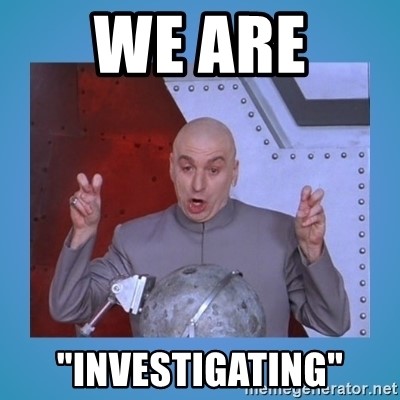Managing Frivolous FCRA Disputes
Written by Reginald Watson, Regulatory Compliance Counsel, NAFCU
Greetings Compliance Friends!
The topics addressed by the NAFCU Compliance Team seem to ebb and flow with the ever-changing regulatory landscape. One seemingly consistent area of concern for credit union compliance officers is the federal regulatory requirements for investigating disputes under the Fair Credit Reporting Act (FCRA).

As many know, the FCRA encourages but does not require financial institutions to provide consumer information to credit reporting agencies (CRAs). If a credit union decides to furnish information to a CRA, the FCRA and Regulation V (which implements the FCRA) both require the credit union to "establish and implement reasonable written policies and procedures concerning the accuracy and integrity of the information it furnishes to consumer reporting agencies." 12 C.F.R. §1022.42. See also, CFPB Bulletin 2016-01.
Along with these requirements, credit unions are also required to maintain the accuracy of information that is reported by investigating member disputes. Within 30 days after receiving a direct dispute notice, the rule requires credit unions to review all relevant information provided by the member, conduct a reasonable investigation of the dispute, and report the results of the investigation to the member. If the investigation finds that information reported was inaccurate, the credit union would then be required to “promptly notify” each CRA of the inaccurate determination and provide them with the necessary corrections to ensure the accuracy of the information. 12 C.F.R. §1022.43(e).
Additionally, for the period of investigation into a direct dispute, the FCRA seems to limit the furnisher's ability to report information that is currently in dispute. Provided below is some commentary from the FTC’s 40 Years’ Experience with the FCRA, which that agency created in preparation of jurisdiction over the FCRA transferring from the Federal Trade Commission (FTC) to the Bureau of Consumer Financial Protection (BCFP):
Section 623(a)(3) provides, “If the completeness or accuracy of any information furnished by any person to any consumer reporting agency is disputed to such person by a consumer, the person may not furnish the information to any consumer reporting agency without notice that such information is disputed by the consumer.”
1. RELATION TO OTHER SECTIONS Section 623(a)(8) allows consumers to dispute items directly with furnishers, in accord with rules that this section required the Commission and the Federal financial agencies to establish. See comment 623(a)(8)-1. Starting July 21, 2011, the Bureau assumes that rulemaking authority.
2. GENERAL This section provides that, when a consumer disputes the completeness or accuracy of any information furnished to a CRA, the furnisher may not furnish the information in question to the CRA without notice that it is disputed by the consumer. It addresses the furnisher’s obligation only when the furnisher continues to report disputed information. The furnisher may choose to temporarily cease reporting the disputed information while it investigates the matter. After the investigation, the furnisher may either (1) correct the information or (2) report the item as disputed by the consumer.
FTC’s 40 Years’ Experience with the FCRA, p. 92-93 (emphasis added).
FTC guidance was formally rescinded when jurisdiction for the FCRA transferred to the Bureau, but the Bureau has not replaced this body of guidance, so it can be instructive. Thus, it appears there is a longstanding interpretation that the FCRA requires furnishers who continue to report information while a dispute is being investigated to also notify the CRA of the dispute. A failure to properly follow these dispute resolution procedures can lead to enforcement actions and hefty fines as discussed in this recent NAFCU blog post. But what happens when the dispute is frivolous?
For some disputes, Regulation V removes the requirement to complete an investigation if the credit union reasonably believes that the dispute is frivolous or irrelevant. Under paragraph (f) of section 1022.43, a dispute qualifies as frivolous if:
(i) The consumer did not provide sufficient information to investigate the disputed information as required by paragraph (d) of this section;
(ii) The direct dispute is substantially the same as a dispute previously submitted by or on behalf of the consumer, either directly to the furnisher or through a consumer reporting agency, with respect to which the furnisher has already satisfied the applicable requirements of the Act or this section; provided, however, that a direct dispute is not substantially the same as a dispute previously submitted if the dispute includes information listed in paragraph (d) of this section that had not previously been provided to the furnisher; or
(iii) The furnisher is not required to investigate the direct dispute because one or more of the exceptions listed in paragraph (b) of this section applies.
Although the credit union is not required to investigate a frivolous dispute, the regulation does require the credit union to notify the member of its frivolous determination within five business days and provide the reasons for the determination including any additional information required to actually investigate the claim. See, 12 C.F.R. §1022.43(f)(3).
Recently, the question has also come up of what to do when a member bypasses the credit union and disputes the accuracy of furnished information directly with a CRA. Neither the FCRA nor Regulation V seem to place any obligations on furnishers in this scenario; however, the credit union may be contractually obligated to cooperate with a CRA's request for additional information. It may also be worthwhile down the line to cooperate with a CRA's investigation from a reputational risk perspective.
The following resources may also provide helpful information:
